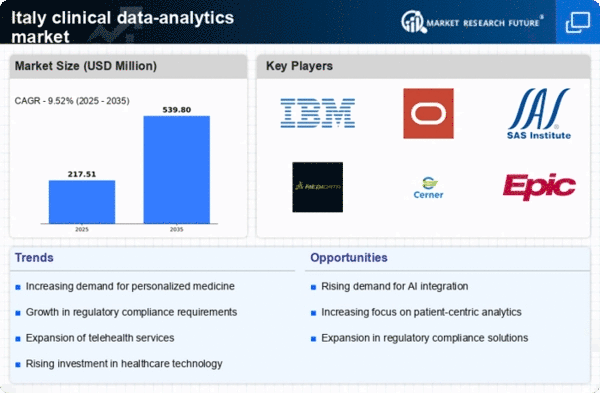Emphasis on Regulatory Compliance
The emphasis on regulatory compliance significantly influences the clinical data-analytics market in Italy. As healthcare organizations navigate complex regulatory landscapes, the need for compliant data analytics solutions becomes paramount. The Italian government, alongside European Union regulations, mandates stringent data protection and privacy standards, compelling organizations to adopt advanced analytics tools that ensure compliance. This regulatory environment fosters a market for solutions that not only meet legal requirements but also enhance data security and patient trust. The clinical data-analytics market is likely to expand as organizations invest in technologies that facilitate compliance, thereby mitigating risks associated with data breaches and non-compliance penalties.
Growing Focus on Personalized Medicine
The growing focus on personalized medicine serves as a significant driver for the clinical data-analytics market in Italy. As healthcare shifts towards tailored treatment approaches, the demand for analytics that can interpret complex patient data increases. This trend is reflected in the rising number of clinical trials and research initiatives aimed at understanding genetic and environmental factors influencing health outcomes. The clinical data-analytics market is expected to benefit from this shift, with projections indicating a potential market growth of 20% by 2027. By harnessing data analytics, healthcare providers can develop more effective, individualized treatment plans, ultimately enhancing patient satisfaction and outcomes.
Investment in Health IT Infrastructure
Investment in health IT infrastructure is a critical driver for the clinical data-analytics market in Italy. As healthcare organizations strive to modernize their systems, substantial financial resources are allocated to enhance data collection, storage, and analysis capabilities. The Italian government has initiated various funding programs aimed at improving digital health technologies, which is expected to bolster the clinical data-analytics market. With an estimated investment of over €1 billion in health IT by 2025, the focus on building robust infrastructure facilitates seamless data integration and interoperability. This investment not only supports the growth of analytics solutions but also ensures that healthcare providers can harness the full potential of clinical data to drive innovation and improve patient care.
Rising Demand for Data-Driven Insights
The clinical data-analytics market in Italy experiences a notable surge in demand for data-driven insights. Healthcare providers increasingly seek to leverage data analytics to enhance decision-making processes, improve patient outcomes, and optimize operational efficiency. This trend is underscored by a projected growth rate of approximately 15% annually in the sector, as organizations recognize the value of actionable insights derived from clinical data. The integration of advanced analytics tools enables healthcare professionals to identify trends, predict patient needs, and allocate resources more effectively. Consequently, the clinical data-analytics market is positioned to play a pivotal role in transforming healthcare delivery in Italy, fostering a culture of evidence-based practices that ultimately benefit patients and providers alike.
Collaboration Between Healthcare Stakeholders
Collaboration between healthcare stakeholders is emerging as a vital driver for the clinical data-analytics market in Italy. Partnerships among hospitals, research institutions, and technology firms facilitate the sharing of data and resources, fostering innovation in analytics solutions. This collaborative approach enables stakeholders to address common challenges, such as data silos and interoperability issues, which have historically hindered effective data utilization. The clinical data-analytics market is likely to thrive as these partnerships lead to the development of comprehensive analytics platforms that enhance data accessibility and usability. By working together, stakeholders can leverage collective expertise to drive advancements in clinical data analytics, ultimately improving healthcare delivery across the country.
















